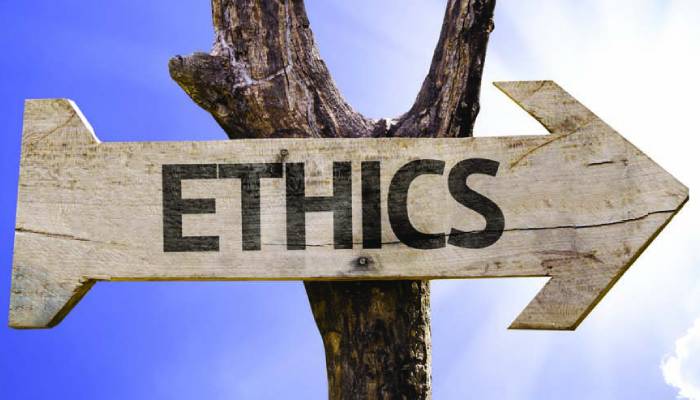
or

Law is a normative value to help society live in collectivity and harmony. For law to be a supreme regulator of all, it must become integral in theory and practice. An integral dimension of law helps State, society and legal systems to balance and harmonize competing claims arising out of complexity and heterogeneity of life and changing needs. Professor Dr. K. Parameswaran outlines his integral theory of law in this series of articles by showing how law must integrate knowledge from other disciplines; bring them under what law wants from them. “…Thus, when law becomes integral, it opens practical and yet unfailing solutions to assist peace, progress, prosperity and protection of all, for our current times and future age…” – author claims. In this article, Part II, author explains the ‘integral dimension of law’ that exists between Law and Ethics.
When it comes to normative ethics, it is something that sets standards for actions. It is the ought-to-be in social actions as the norm of collectivity expects standards for individual-collective interrelationship in order to avoid accidents from the clash of rights and duties. For example, a normative ethical question could be – ‘How should State teach moral values to citizenry in order to bring the best out of everyone?’ This question cancels the meta ethical question as to what or where is the meaning given to the word ‘moral’ itself, at the first instance.Thus avoidance or inclusion of any normative ethical question in law is largely based on aims and functions attributed to State. State has a possibility to claim legal ideals if Statesociety interactionsare positive or normative to the extent they both accept normative values of ethics.
This normativity gives an ideal situation for State and society. A best example of normative ethical question would be – ‘Should State ban drinking alcohol in order to promote health of the citizenry?’ There is no certainty to the answer as value norms between State and society fixed in their mutual interrelationships decide its outcome. Whereas applied ethics is something that has come to level of application of ethical principles in individual and collective life.
For example, an applied ethical question could be – ‘Should State ban smoking cigarettes in order to promote not only health of smokers who form part of citizenry but also avoid irreparable damage to;
Modelethics and realethics have a close connection in both acceptability and applicability in the two-way mutual interrelationshipbetween State and society. Except that the right and wrong, good and bad, moral and immoral, correct and incorrect becomes a subject matter of real dispute gone before a court of law between their ethical narratives impacting their lives and interests. Let us take one glaring example of Section 35 from the Indian ‘Advocates Act of 1961’,a legislation where punishment for professional misconduct of an advocate is given.
Chapter V of the said aCt that deals with ConduCt of advocates reads the following: seCtion 35. punishment of adVoCates for misConduCt:
It is to be noted that the crucial word ‘misconduct’ is not explained in the Act except by the courts of law that deal with ‘misconduct’ of advocates in their legal profession. There is a large body of caselaws which serve as precedents to us at the moment though they cannot give actual explanations as intended by the respective Act. Is non-explanation of the word ‘misconduct’ serves the legislative purpose and outcome? Can courts of law all the time involve in explaining the meaning for the word ‘misconduct’ based on cases that come before them? What are the reasons for this situation? Does this situation promote ethical conduct of advocates or devalues ethicality in legal profession in the society? What are the guiding principles of ethics in legal profession to understand the true definition, nature and function of professional (mis)conduct? Based on the method of integral dimension of law between law and ethics, ethical value of client, cause, care and change – a quadrant-principle emerge to bring true value of ethics to legal profession and justice. Follow Part III, Conclusion that explains the nature of this quadrantprinciple of ethics in legal profession in relation to professional (mis)conduct.
Dr. K. Parameswaran, Associate Professor of Law, and has been Former Dean at Gujarat, National Law University (GNLU), Gandhinagar, taught at Symbiosis School of Law, Pune, NLSIU, Bangalore, NLU, Jodhpur, University of Madras, Indian Institute of Teacher Education (IITE), Gandhinagar, worked at Publication Department of Sri Aurobindo Ashram, Pondicherry. He authored ‘The Integral Dimensions of Law’ (LexisNexis).

Lex Witness Bureau

Lex Witness Bureau

For over 10 years, since its inception in 2009 as a monthly, Lex Witness has become India’s most credible platform for the legal luminaries to opine, comment and share their views. more...
Connect Us:


The Grand Masters - A Corporate Counsel Legal Best Practices Summit Series
www.grandmasters.in | 8 Years & Counting
The Real Estate & Construction Legal Summit
www.rcls.in | 8 Years & Counting
The Information Technology Legal Summit
www.itlegalsummit.com | 8 Years & Counting
The Banking & Finance Legal Summit
www.bfls.in | 8 Years & Counting
The Media, Advertising and Entertainment Legal Summit
www.maels.in | 8 Years & Counting
The Pharma Legal & Compliance Summit
www.plcs.co.in | 8 Years & Counting
We at Lex Witness strategically assist firms in reaching out to the relevant audience sets through various knowledge sharing initiatives. Here are some more info decks for you to know us better.
Copyright © 2020 Lex Witness - India's 1st Magazine on Legal & Corporate Affairs Rights of Admission Reserved